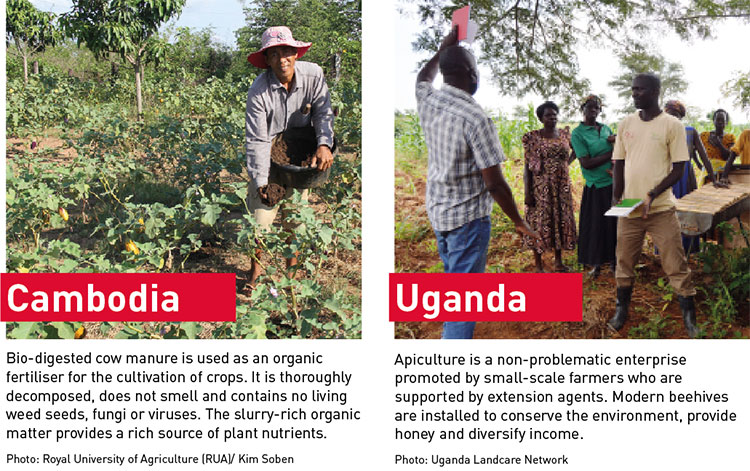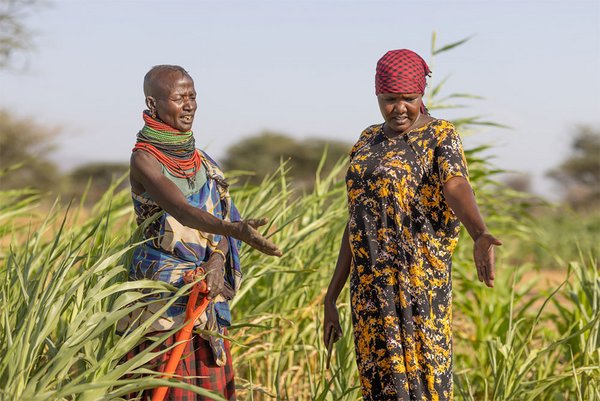 Download this article in magazine layout
Download this article in magazine layout
- Share this article
- Subscribe to our newsletter
WOCAT – spreading sustainable land management world-wide
The United Nations Convention to Combat Desertification (UNCCD) was established in 1994, and the problem was clear: how can we put a halt to land degradation? WOCAT took on that challenge with its mandate to uncover success in sustainable land management (SLM) and bring together like-minded people in a global network. Over the years, WOCAT’s Global SLM Database has grown to nearly 2,200 entries from over 130 countries. The database holds a vast and detailed resource of “how-to-do”. What’s more, it is recognised by the UNCCD as the primary global database for the reporting of SLM. This constitutes a formidable toolbox, helping to achieve Land Degradation Neutrality – a concept enshrined in the sustainable development goals (SDG 15.3). It’s no exaggeration to say that the database already houses the majority of the ways and means to achieve this goal. Around 850 of the database entries relate directly to soil management. The majority of these are grouped either as “improvements in cover” (by vegetation or mulch), or “cross-slope measures” (e.g. terraces and contour grass strips).
When the UN Decade on Ecosystem Restoration was launched in 2021, WOCAT came together with the UNCCD to show what role SLM could play. The publication Restoring Life to the Land demonstrated that already documented SLM practices could contribute to each of the eight ecosystems: from tillage practices in farmlands to community management of forests, from rehabilitation of rangelands to agroforestry on mountain slopes, from wastewater management in freshwater systems to preventing drainage of peatlands, from creating green spaces in urban areas to adopting a “ridge-to-reef” approach to protect the coast.
As SLM has been gradually documented from around the world, so has our understanding of its multiple benefits. It has moved a long distance from simply “saving the soil” under its original name of “soil conservation”. Sustainable land management embraces environmental welfare and human prosperity. Restoring health to the land helps to achieve these goals through its multiple co-benefits. Thus, SLM assists in climate change mitigation by building up carbon in the soil and vegetation, and it strengthens climate change adaptation by making land use systems more robust. Through focusing on biodiversity, it fortifies ecosystem function. Better soil structure and vegetation cover improve hydrological function. Most of all, SLM has been shown to directly benefit people and their livelihoods by making the land more productive.
To illustrate how WOCAT can work in the field, here is a recent example from a three-year collaboration with the International Fund for Agricultural Development (IFAD). WOCAT methodology was piloted to show how SLM could be uncovered, selected and spread in Cambodia, Laos and Uganda. The methodology was based on WOCAT’s strategy of “proof” (building up a knowledge base), “priority” (decision-support) and “pull” (creating conditions for scaling-up). Smallholder’s clear priorities – especially women’s – were practices that led to improved yields and economic gain. Thus, conventional engineering solutions such as terraces or cross-slope barriers were rarely chosen for upscaling. Most attention was given to practices that involved affordable ways of, for example, improving soil fertility, increasing water availability to plants and diversifying sources of income. Case studies from Cambodia and Uganda illustrate these choices.

Nicole Harari is a Research Scientist at the Centre for Development and Environment (CDE), University of Bern, Switzerland, managing the WOCAT Network on behalf of CDE.
Rima Mekdaschi Studer is a Senior Research Scientist at the CDE, University of Bern. As an agronomist, she has wide experience and skills in plant production with a focus on drylands.
William Critchley holds a PhD in sustainable land management and is a consultant to WOCAT as an editor and chief reviewer of submissions to the global database.
Contact: nicole.harari(at)unibe.ch
WOCAT is helping to put sustainable land management on the global agenda through its global network.
More information: www.wocat.net




